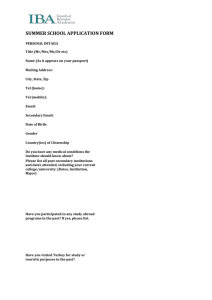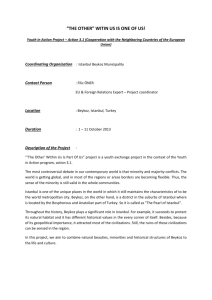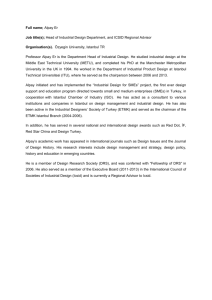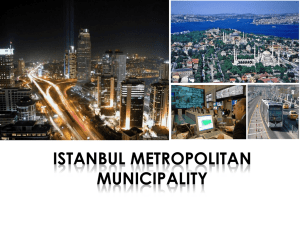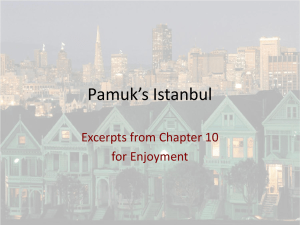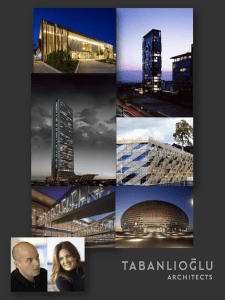HIST 245: History of Istanbul: Ancient to Contemporary
advertisement
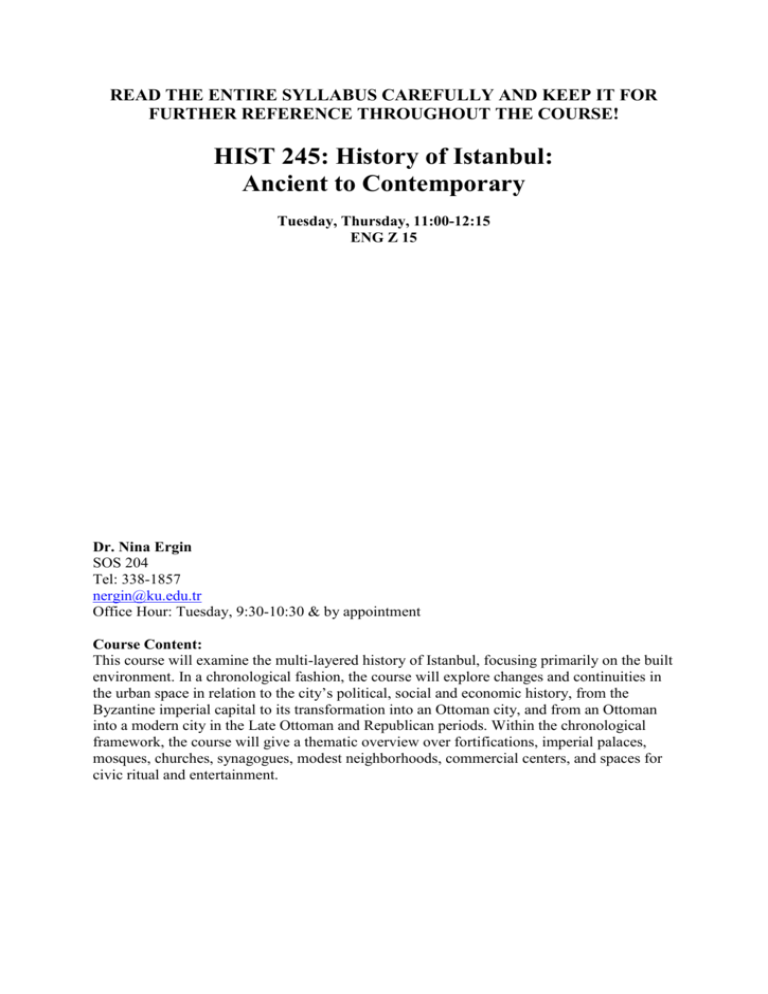
READ THE ENTIRE SYLLABUS CAREFULLY AND KEEP IT FOR FURTHER REFERENCE THROUGHOUT THE COURSE! HIST 245: History of Istanbul: Ancient to Contemporary Tuesday, Thursday, 11:00-12:15 ENG Z 15 Dr. Nina Ergin SOS 204 Tel: 338-1857 nergin@ku.edu.tr Office Hour: Tuesday, 9:30-10:30 & by appointment Course Content: This course will examine the multi-layered history of Istanbul, focusing primarily on the built environment. In a chronological fashion, the course will explore changes and continuities in the urban space in relation to the city’s political, social and economic history, from the Byzantine imperial capital to its transformation into an Ottoman city, and from an Ottoman into a modern city in the Late Ottoman and Republican periods. Within the chronological framework, the course will give a thematic overview over fortifications, imperial palaces, mosques, churches, synagogues, modest neighborhoods, commercial centers, and spaces for civic ritual and entertainment. 29 September Introduction & Course Overview 1 October Urban History Spiro Kostoff, “The City in History & What is a City?,” The City Shaped: Urban Patterns and Meanings Through History (London: Thames & Hudson, 1991), 29-41. 6 October Byzantium before and under Constantine I 8 October Byzantium before and under Constantine II Doğan Kuban, “The Site and Its First Settlements & The City of Byzantion,” Istanbul, An Urban History: Byzantion, Constantinopolis, Istanbul (Istanbul: Economic and Social History Foundation of Turkey, 1996), 11-25, 28-49. [hereafter: Kuban] 13 October Constantinople in the Early Byzantine Period I 15 October Constantinople in the Early Byzantine Period II Kuban, 50-52, 72-104, 105-117. 20 October 22 October Constantinople in the Middle Byzantine Period I Constantinople in the Middle Byzantine Period II SUBMIT PRESENTATION TOPIC Kuban, 127-130, 149-167. 27 October 29 October Constantinople in the Late Byzantine Period I Holiday – no class 3 November Constantinople in the Late Byzantine Period II Preparing and Giving Effective Presentations 5 November From Constantinople to Istanbul I Kuban, 174-188. 189-193, 206-245. 10 November From Constantinople to Istanbul II 12 November Istanbul in the Late Fifteenth Century I Kuban, 250-286. Gülru Necipoğlu, Architecture, Ceremonial and Power: The Topkapı Palace in the Fifteenth and Sixteenth Centuries (Cambridge, London: MIT, 1991), 3-22. 14 November (Saturday) 17 November 19 November Excursion to Sultanahmet Istanbul in the Late Fifteenth Century II MIDTERM 24 November Istanbul in the Sixteenth Century I 26 November Holiday – no class Gülru Necipoğlu-Kafadar, “The Süleymaniye Complex in Istanbul: An Interpretation,” Muqarnas 3 (1985): 92-117. 1 December Istanbul in the Sixteenth Century II 3 December Istanbul in the Seventeenth Century Review Gülru Necipoğlu-Kafadar, “The Süleymaniye Complex in Istanbul: An Interpretation,” Muqarnas 3 (1985): 92-117. Kuban, 291-301. 8 December 10 December Kuban, 336-362. Istanbul in the Eighteenth Century SUBMIT PRESENTATION OUTLINES Instructor away at conference – no class 15 December Istanbul in the Nineteenth Century 17 December Istanbul in the Early Republican & Contemporary Period Kuban, 376-413, 417-434, 435-458. 19 December (Saturday) Excursion to Karaköy 22 December 24 December no class – sign up for individual practice presentation no class – sign up for individual practice presentation 29 December 31 December STUDENT PRESENTATIONS STUDENT PRESENTATIONS 5 January STUDENT PRESENTATIONS 7 January STUDENT PRESENTATIONS FINAL to be announced *** Readings and Course Resources: A course reader is available from the Xerox Center in the library. You are expected to do the readings before the class. There will be unannounced quizzes about their content before we discuss them. The slides to the lectures and student presentations will be available on the F-drive. Use them to compliment your lecture notes and review them frequently in order to remind yourself of the material that could come up on unannounced quizzes. There are many books on Istanbul that you can consult while preparing your presentation. Many of them are in our library, so be sure to go there and browse through the catalogue as well as through the bookshelves. A particularly useful reference work with which to start your research is: Dünden Bugüne İstanbul Ansiklopedisi (Bayramoğlu Collection, DR719.I87, 2nd floor of library). Usually, the internet is not a reliable source for information, but there are a few scholarly websites you may use for reference: Byzantine architecture: www.byzantium1200.org Islamic architecture: www.archnet.org primary source texts: www.fordham.edu/halsall/sbook.html … as well as any other websites put together for academic purposes (i.e. course syllabi and images posted on university websites [those ending on .edu]) Grading Policy: Your grade will be calculated based on a midterm, a final, a presentation based on your own research, your participation and a number of smaller unannounced quizzes and exercises. Midterm Final Presentation outline Presentation Participation Quizzes Total 20 20 5 25 15 15 100 Failure to complete any of the assignments or exams will result in zero (0) points for that component. Assignments to be completed at home are always due at the beginning of the class period. Late assignments will not be accepted. Midterm and Final: These two exams will be of the same format. You will receive more information on these two exams as the course progresses. So much can be said in advance: You need to memorize the most important dates, but even more important is that you have an understanding of the significance of events. Be aware that material from the excursions and presentations will be included in the exams! Presentation: Together with a partner, you will give a well-researched, well-prepared and rehearsed presentation with the help of powerpoint slides on a topic of your choice. The topic can be an event in the history of Istanbul, a specific monument, or a neighborhood in the city. (No presentations on your high school — I have heard enough of those!) You will need to have your topic approved by the instructor. You will also need to submit a written outline, which will be graded. In order to prepare your presentation, you will need to do library research, collect scholarly information and visit the monument, the neighborhood or the site of the event and take some pictures to be included in the presentation. You will receive further instructions on how to do research, on how to prepare and deliver an effective presentation as the course progresses. Participation: I will take attendance during classes. You are allowed to miss a total of four sessions. Any further absence will result in an F for the entire course. You need to attend at least one of the two excursions in order to pass this course. In addition to being physically present, I expect you to be mentally present and contribute to the class by asking questions and participate in discussions. (Nothing is worse for an instructor than talking to a group of unresponsive people … ) You will lose points for participation if you … disrupt the class by using your cell phone, iPod or Blackberry (making or receiving calls, sending SMS, taking pictures, surfing the net), come late, leave the class and come back, leave early, chat with your fellow students, are in any way disrespectful to your fellow students or your instructor. Grade Distribution: A 100-92 A91-88 B+ 87-84 B 83-80 B79-76 C+ 75-72 C 71-68 C67-64 D+ 63-60 D 59-56 Academic Dishonesty: Academic dishonesty in the form of cheating, plagiarism, or collusion are serious offenses and are not tolerated at Koç University. University Academic Regulations and the Regulations for Student Disciplinary Matters clearly define the policy and the disciplinary action to be taken in case of academic dishonesty. Failure in academic integrity may lead to suspension and expulsion from the University. Cheating includes, but is not limited to, copying from a classmate or providing answers or information, either written or oral, to others. Plagiarism is borrowing or using someone else’s writing or ideas without giving written acknowledgment to the author. This includes copying from a fellow student’s paper or from a text (whether printed or electronic) without properly citing the source. Collusion is getting unauthorized help from another person or having someone else write a paper or assignment.

